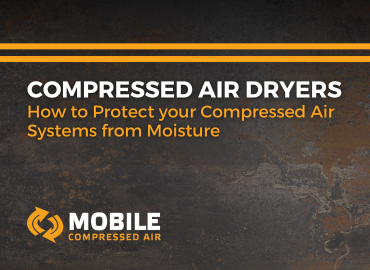Air Dryers: Protect Your Compressor from Moisture
Moisture can damage pneumatic machinery and processes. This is where compressed air dryers play an important role in ensuring the quality and reliability of compressed air across a range of South Australian industries which includes food and beverage. When deciding on the right air dryer, there are a few choices to make depending on your requirements. So, let’s delve into what compressed air dryers are, why they are required, the different types, and how to choose the right size for your operation.
What Does a Compressed Air Dryer Do?
A compressed air dryer maintains the integrity of compressed air systems by removing moisture and contaminants from the compressed air. When air temperatures reach dew point, water vapor condensates within the compressor creating significant problems for your compressed air system. Air dryers work by removing condensate within the system through processes such as absorption or refrigeration, safeguarding the equipment and products from the effects of excess moisture such as rust, corrosion, and microbial growth.
Why Do I Need an Air Dryer?
A compressed air dryer should be in use with an air compressor, especially when we consider the potential corrosion and damage that moisture can cause within a compressed air system. By using an air dryer, businesses can proactively protect their equipment, significantly extend its lifespan, and avoid costly repairs. Without an air dryer, it is also possible that any moisture or corrosion debris could end up in your product. Furthermore, by removing moisture, air dryers prevent microbial growth which could contaminate or spoil your product. This is critical in industries such as food manufacturing and pharmaceuticals, where contamination could render the product unfit to be sold. Therefore, the quality of your product and life cycle of your equipment depends on your air dryer.
Types of Compressed Air Dryers: Refrigerant vs. Desiccant
There are two common types of compressed air dryers: refrigerant dryers and desiccant dryers. Each has its own working principles, advantages, and applications.
Refrigerant Air Dryers
Refrigerant air dryers work by cooling the incoming compressed air to lower its temperature. When the air is cooled, moisture vapour in the air condenses into liquid water, which is then separated and drained from the system. This process reduces the dew point of the compressed air, making it less likely to form condensation as it travels through the equipment. Refrigerant dryers are suitable for general industrial applications where the level of dryness does not have to be extremely low. This type of dryer tends to be energy-efficient, and has a simple, compact design.
Desiccant Air Dryers
Desiccant air dryers work by using an adsorbent material (a desiccant) to remove moisture from the compressed air. The desiccant absorbs moisture vapour, effectively drying the air. These dryers supply extremely dry air, making them suitable for applications where low dew points are critical, such as electronics manufacturing, pharmaceutical cleanrooms, and food packaging.
Ultimately, the choice between refrigerant and desiccant compressed air dryers depends on the level of air dryness required by your operation.
What Size Compressed Air Dryer Do I Need?
The size of your compressed air dryer is determined by your required air flow output, moisture level, and your operating conditions. Begin by understanding the volume of air your compressed air system requires. Measured in cubic metres per minute (m3/min), this can be found in your compressor’s specifications.
Different applications require different air dryness levels. You also need to consider your dew point when it comes to your applications. For standard industrial applications, a dew point of around 4°C is usually acceptable. Lower dew points might be necessary for more sensitive applications like electronics manufacturing or pharmaceuticals.
Another factor that will determine dryer size is your operating conditions. Air can hold more moisture in hotter temperatures, requiring a more powerful dryer. Conditions fluctuate on a day-by-day basis, therefore, choose a dryer that slightly exceeds your compressor’s output. This prevents overworking the dryer and ensures efficient moisture removal. Take note of the correction factors that are supplied by the manufacturer will take ambient temperatures into account when it comes to choosing the size of your air dryer.
When choosing your ideal size of compressed air dryer, we highly recommend reviewing the manufacturer’s recommendations and consulting with a compressed air professional.
Compressed Air Dryers in Adelaide
When it comes to air dryer solutions in Adelaide, Mobile Compressed Air is the reliable choice. Air dryer efficiency can be influenced by the temperatures in South Australia. Using our knowledge of local conditions, we make a special effort to match the dryer size with your requirements and our knowledge of local conditions. And with over 35 years in pneumatics, we are more than qualified to find the most efficient solution for you.
Mobile Compressed Air stocks a variety of compressed air dryers from one of the world’s leading manufacturers, Kaeser Compressors. From energy-efficient refrigerant dryers to desiccant dryers with pressure dew points as low as -70°C, and even combination dryers that take advantage of both technologies, they have an air dryer to suit your operation.
As discussed, compressed air dryers are instrumental in prolonging your compressor’s lifespan and ensuring the quality of your product. To optimise your compressed air operation, contact Mobile Compressed Air today.
About Mobile Compressed Air
Mobile Compressed Air has been proudly serving South Australian businesses since 1985. We are proud to be the Compressor Company of Choice for many of the state’s leading manufacturers. Backed by international experience and support from our suppliers, you can rest assured that your air compressor system is energy efficient and will run reliably for many years.
Mobile Compressed Air is a proud member of The Crommelin Group.

